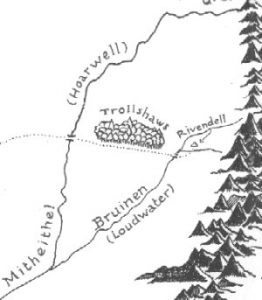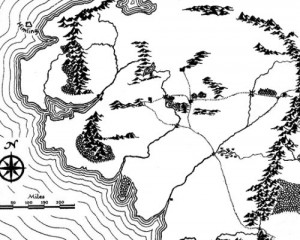Q: How Important was the Angle in Middle-earth?
ANSWER: The Angle was the land between the Mitheithel (Hoarwell or possibly “boundary river”) and Bruinen (Loudwater). At the time of the War of the Ring the Angle was the home of the Dunedain of the North (Aragorn’s people). Although J.R.R. Tolkien does not explain why the Dunedain chose to live in that region, he often placed secretive peoples in woodlands that were bordered by two rivers. The Folk of Haleth retreated to a stockade they had built between two rivers in Thargelion in the First Age, and the Elves of Lothlorien dwelt mostly in the woodlands near the confluence of the Nimrodel and Anduin rivers.

In the Second Age the Noldor and Sindar who established Eregion settled between the Glanduin and Gwathlo rivers, and their descendants — the survivors of Eregion who retreated north with Elrond — found another defensive position at Imladris, which also lay between two rivers. These kinds of natural defensive boundaries make the survivability of some of Tolkien’s fictional settlements through thousands of years of war more plausible.
When Elendil established his kingdom of Arnor at the end of the Second Age he claimed the lands between the Mitheithel and the Bruinen rivers. Tolkien seems to imply there were already Men living in these lands, although he does not specifically state so. These Men might have been related to the Edainic peoples who once inhabited all of Eriador, or they may have been related to some of the clans of Easterlings who attacked Beleriand in the First Age. The hill-folk of Rhudaur and the Men of Angmar may be the descendants of some of the Easterlings who fled the destruction of Beleriand.
None of J.R.R. Tolkien’s published notes or stories speak of any watercraft along the Gwathlo north of Tharbad, which was a fordable point on the river where the Numenoreans built a bridge. Numenorean ships were able to navigate the river as far north as Tharbad. Beyond that point maybe only small boats would have been used on the river. Hence, there is no reference to any Numenorean city or port in or near the Angle.
In the chapter “The Ring Goes South” Tolkien provides very little description of the lands between the Bruinen and the mountains; it is a rough mix of hills and gullies populated by thorny bushes and occasional swamps. No one lived in the area and it doesn’t sound like it would ever have been claimed as a homeland by any ancient people.

By contrast, more than a thousand years before Aragorn’s people were living in the Angle it was populated by Hobbits and other Men, including the Dunedain of Rhudaur (“evil wood”) who were eventually destroyed or driven out. During the wars with Angmar Rhudaur briefly protected the passage between Imladris and the rest of Eriador, but after Rhudaur was destroyed in the war of Third Age year 1409 Imladris was besieged for a time (Note: As pointed out in the comments below, the siege is said to have occurred before the War of 1409, during the War of 1356). Elrond’s people (with help from Lorien) had to take back control of the Angle when Angmar’s forces were finally driven back (added Jul 1, 2012: after the invasion of 1409).
As the Dunedain of the North dwindled they seem to have gradually retreated toward Imladris rather than Lindon. The reason must be that Elrond was able to marshal greater forces the Cirdan and the Elves of Lindon — even if only because Elrond could call upon Lorien for help. The last time the Elves of Imladris went to war was during the War of Third Age year 1974, when with Gondor’s help the Elves, Dwarves, and Men of Eriador finally overthrew Angmar.
Being close to the Elves of Imladris would have ensured the Dunedain of the Angle had friends and resources to call upon; and the Angle itself seems to have been a land easily capable of supporting a population when it was not threatened by war. Nonetheless, either because of their small numbers or from a desire for secrecy the Dunedain did not build any cities in the Angle. Aragorn seems to confirm as much when he tells Eomer and Imrahil that he will not enter Minas Tirith yet, but rather will pitch his tents before the city “as a captain of the Rangers, who are unused to cities and houses of stone”. Although his remark may seem glib Aragorn is not known to lie or exaggerate. His people must have had few if any stone dwellings.
The Angle must therefore be viewed as a remote wilderness area adjacent to the only major east-west road passing through Eriador. That it was a wilderness is attested by Tolkien’s own description of the Dunedain’s living in a “fastness in the wilderness”. But whether they lived in separate homesteads as families or small clans in one or more small villages, the Dunedain would have needed paths and/or trails if not actually small roads to at least reach Imladris and the great east-west road. The Rangers would have been passing in and out of the Angle quite often.
So while the Angle was not an administrative center or abode of great political or martial power for the Dunedain of the late Third Age it was nonetheless a relatively safe and peaceful refuge. They would only have needed to defend a northern boundary — a fact made clear by a few references to the Rangers’ excursions into the Trollshaws and Ettenmoors on occasion. It may be reasonable to assume that they maintained an approximate boundary at or near the east-west road. South of that area few if any evil creatures would have been permitted to go.
# # #
Have you read our other Tolkien and Middle-earth Questions and Answers articles?

Do you think there could have other Ranger settlements in Eriador? And what about population (circa T.A. 3019)? In the hundreds or thousands? Also, in The Hobbit the stone trolls were reportedly menacing people ‘in the district’. Could these people have been the Rangers in the Angle?
Cole, I speculated on all those things in my essay “Of Thegns and Kings and Rangers and Things”. I think you’ll enjoy reading it.
The short answer is I don’t believe there would have been any Dunadan communities closer to the Shire than the Angle at the time of the Lord of the Rings (or, say, after Tharbad was deserted). I suspect Tolkien may have imagined beteen 1,000 and 5,000 Dunedain living in the North but that is pure guesswork on my part. I think the people mentioned in The Hobbit were just generic people as there were no Dunedain in Tolkien’s fiction at the time he wrote The Hobbit.
If he gave any thought to revising that statement, he may have concluded that the Dunedain were a suitable justification for leaving it in place.
Actually the siege of Rivendell began not after but some time before the war of 1409, during the reign of Arveleg I of Arthedain (acceded 1356, killed in the war). At this time Rhudaur had already fallen under the influence of Angmar; it still included the Angle, as the account makes clear. In 1409 “evil men subject to Angmar” occupied Rhudaur outright, and the remaining Dunedain were slain or fled west.
So I should say that the evidence for the Dunedain retreating “toward Imladris rather than Lindon” is slender to non-existent. Everything suggests that their dwindling territory was centred on Fornost. Most likely after the 1409 war the Angle was simply deserted; the power of Rivendell being sufficient to contain Angmar’s proxies to the north of the Road, and the Stoors having already fled.
There does seem to be a remarkable desire to find a home for the Rangers! This is despite the fact that they are repeatedly described as mysterious wanderers, a secret people wandering in the wild, etc., implying that they have no fixed abode. Such a lifestyle would fit with the mistrust in which they are held by the Bree-folk; similar to the suspicions entertained of “travellers” (gypsies) in various countries to this day.
The passage you cite as locating the Rangers in the Angle, because it is more than 300 miles East from the Shire, is actually at pains to contrast the “settled dwellings” of the Bree-men with the “mysterious wanderers”. So it is really reinforcing the dissociation of the Rangers from any fixed location.
Again, in ‘The Ring Goes South’ the Rangers help out with the western part of the search, down the Greyflood. It doesn’t give any real clue to their base, other than suggesting it is somewhere west of Rivendell.
The published work says only of Aragorn’s home that it is “the North”, and Gilraen’s, “Eriador”. Admittedly this could reflect merely a habitual secrecy, without ruling out some kind of settlement. However the “fastness in the wilderness” was after all dropped, along with the reference to the Angle. Probably if the Rangers did have settlements they were both well concealed and easily uprooted.
I agree, we know nothing of Tharbad’s inhabitants. I have, however, for many years believed that Bilbo’s clock was procured from there.